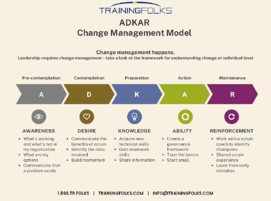Top 5 Soft Skills That Improve Your Business

LinkedIn’s Global Talent Trends report found that 92% of talent professionals believe soft skills are as important, if not more important than hard skills in their workforce.
Soft skills are the skills an individual uses to navigate their social environment—sometimes called social intelligence. In combination with hard skills, which are the practical or technical skills required for a task, soft skills enable effective collaboration and communication. Whether or not you realize it, your business relies on soft skills for its growth and development.
Here are some of the top 5 soft skills to consider fostering in your corporate training programs.
- Accountability
Personal accountability means taking responsibility for your decisions. In the workplace, accountability can look like this:
- Following through on a deadline or meeting date
- Taking ownership for your part in a workplace conflict or mistake
- Repairing and learning from conflicts and mistakes
To hone workplace accountability, corporate training programs may help employees identify their roles and responsibilities, practice time management, and learn how to set boundaries to avoid overcommitment.
- Self-awareness
Self-awareness is just as it sounds: the ability to identify your own behaviors, emotions, patterns, and other traits. This has several benefits at the workplace: it supports communication, facilitates collaboration with your colleagues, and helps you identify which soft skills need attention.
In high-stress work environments, self-awareness can help you identify and regulate intense emotions so you can revisit projects and make decisions when you’re in a calmer state of mind. This aspect of self-awareness can go a long way to avoiding potential workplace conflicts.
Corporate training programs may incorporate self-awareness activities to promote this soft skill.
- Empathy
Empathy is the ability to understand and feel another person’s experience. At the workplace, this skill is valuable for identifying others’ needs, which is crucial in leadership positions. Empathy also helps identify burnout, develop deeper workplace relationships, and foster creativity—which all support collaboration and productivity.
Empathy-based relationship building is especially useful in a distributed workforce where in-person exchanges aren’t as common. Empathy can even improve client relationships and level up your organization’s customer service.
Empathy is a learned soft skill. Organizations can use training programs to educate employees on the importance of empathy and encourage discussions on the topic.
- Communication
Communication skills enable people to give and receive information effectively. Honing this soft skill requires active listening, the use of clear and active language, and adapting your communication style to the audience. Empathy, self-awareness, and accountability all play into effective workplace communication.
Training programs may also provide communication guidelines specific to your workplace. This might include which communication style to use in specific interactions, like customer service. Employees also benefit from training on how to communicate specific information (e.g. is email, phone, or in-person more appropriate?) and who should receive it (is it relevant for the manager or the entire team?).
Beyond fostering team relationships, communication skills can also improve workplace productivity and help avoid conflicts and errors.
- Creativity
Businesses rely on creativity and innovation to differentiate from competitors and grow. Creativity starts at the individual level and isn’t just for artists—it’s one of the top 5 soft skills that anybody can learn. Creative thinking helps employees solve problems, promotes teamwork, and increases productivity. Giving employees space to develop and practice creativity can also help attract talent and reduce employee turnover.
Corporate training sessions can promote brainstorming sessions, research skills, and problem-solving simulations to teach employee creativity.
Despite common belief, soft skills can be learned—as long as you have access to the right resources. Organizations can leverage corporate training programs to teach employees the soft skills they need to succeed in their roles. Once you have identified which soft skills your organization values most, ensure that your training program accounts for these skills alongside the necessary “hard” skills.
Having employees with a high degree of soft skills is especially critical when companies are going through important changes. Infact, change management levrages these and many other soft skills to help with your companies growth.
Dealing with change in the workplace? Get our FREE Infographic Download:
ADKAR Change Management


